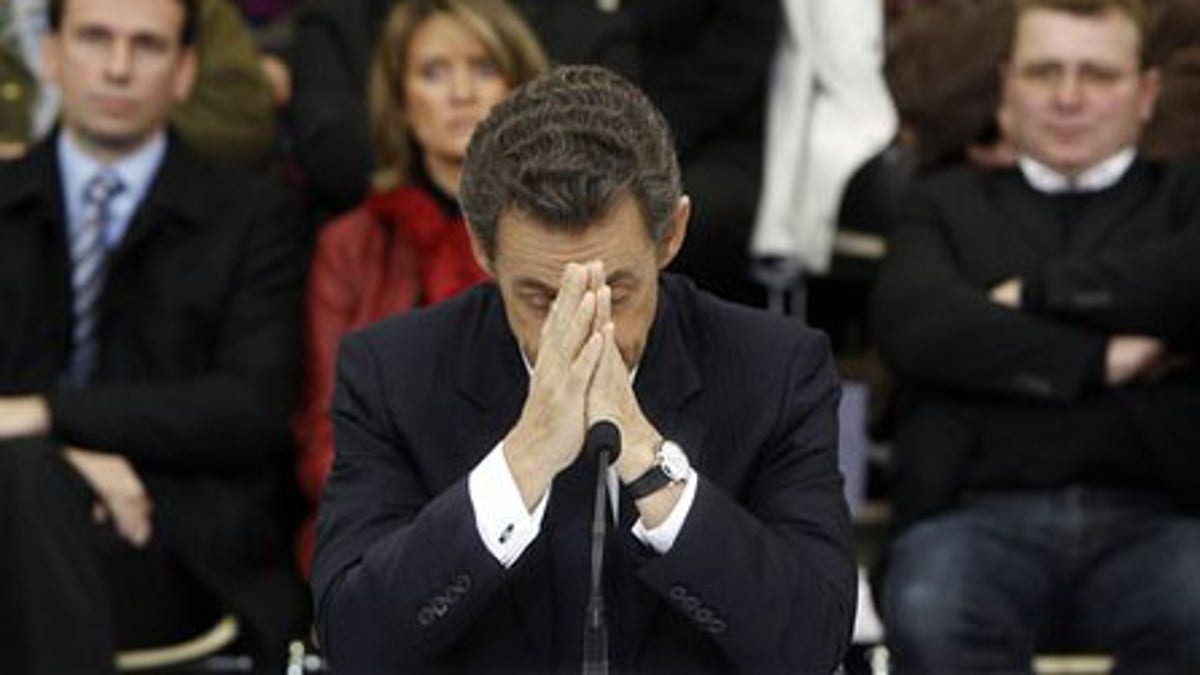
French President Nicolas Sarkozy reacts during a meeting on agriculture, in Mayet-de-Montagne, central France, Thursday Nov. 25, 2010. (AP Photo/Laurent Cipriani) (AP)
PARIS – In a whirlwind first day after winning the French presidency, Socialist Francois Hollande already has a to-do list that includes an invite to the White House, visits to the G-8 and NATO summits and a World War II ceremony with his defeated rival.
The leftist who has pledged to buck Europe's austerity trend and NATO's timetable for Afghanistan appeared before thronging crowds on Paris' Place de la Bastille in the early morning hours Monday, pledging "to finish with austerity." Hours later, he was back at work, arriving at his campaign headquarters around 10:30 a.m. local time.
Hollande will officially become president on May 15, the date for the handover ceremony that the two campaign teams agreed to on Monday.
He has his work cut out to fulfill the hopes his victory has stirred on France's left, overjoyed to have one of their own in power for the first time since Socialist Francois Mitterrand was president from 1981 to 1995.
He must form a new government then pack his bags for some quick international travel in Europe and to the United States.
Even before his start date, the president-elect is due to appear alongside Nicolas Sarkozy at a ceremony Tuesday marking the anniversary of the end of World War II in Europe.
President Barack Obama has extended Hollande an invitation to the White House ahead of this month's summit of the Group of Eight leading economies at Camp David, Maryland. After that, Hollande will attend a NATO summit in Chicago, where he will announce he is pulling French troops out of Afghanistan by the end of the year.
Among the other international leaders calling to congratulate Hollande was Germany's Angela Merkel, who told reporters in Berlin on Monday that she and Hollande had spoken for the first time late Sunday.
"We said we will work well and intensively together," she said. On Merkel's invitation, Hollande will head to Berlin just after assuming the presidency May 15, Pierre Moscovici , who served as campaign manager, told reporters.
Merkel cautioned against hopes that the austerity measures already agreed by European leaders could now be renegotiated. "We in Germany, and I personally, believe the fiscal pact is not up for negotiation," she said.
While some market players have worried about a Hollande presidency, the rating agency Standard and Poor's said his election "has no immediate impact" on France's AA+ credit rating or negative outlook.
Sarkozy is now the latest victim of a wave of voter anger over spending cuts in Europe that has ousted governments and leaders in the past couple of years.
Final results from France's presidential election show Hollande narrowly defeated Sarkozy with 51.62 percent of the vote, or 1.13 million of the 37 million votes cast in Sunday's election.
Sarkozy, who finished the first round about half-a-million votes behind Hollande, failed in his bid to attract sufficient votes from supporters of the far-right anti-EU and anti-immigration candidate Marine Le Pen, leader of the National Front party, with his lunge to the right in the last two weeks of campaigning.
The head of the National Front party refused to endorse either candidate and said she would cast a blank vote. In that, she was followed by more than 2 million others, a total far higher than in previous elections.
Hollande has pledged to tax the very rich at 75 percent of their income, an idea that proved wildly popular among the majority of people who don't make nearly that much. But the measure would bring in only a relatively small amount to the budget, and tax lawyers say France's taxes have always been high and unpredictable and that this may not be as much of a shock as it sounds.
Hollande wants to modify one of Sarkozy's key reforms, over the retirement age, to allow some people to retire at 60 instead of 62. He wants to hire more teachers and increase spending in a range of sectors, and ease France off its dependence on nuclear energy. He also favors legalizing euthanasia and gay marriage.
Hollande has said his first act after the election will be to write a letter to other European leaders calling for a renegotiation of a budget-trimming treaty aimed at bringing the continent's economies closer together. Hollande wants to allow for government-funded stimulus programs in hopes of restarting growth, arguing that debts will only get worse if Europe's economies don't start growing again.
Sarkozy and Germany's Angela Merkel spearheaded the cost-cutting treaty, and many have worried about potential conflict within the Franco-German "couple" that underpins Europe's post-war unity.
French politicians now turn their attention to parliamentary elections next month. With what appears to be a thin victory margin, Hollande must more than ever count on a healthy majority in June legislative elections -- the next challenge for Sarkozy's conservatives.
The Socialists will have blanket control of the country if they get a majority in the decisive lower house of parliament. They already preside over the Senate and hold most regions and municipalities in France.
